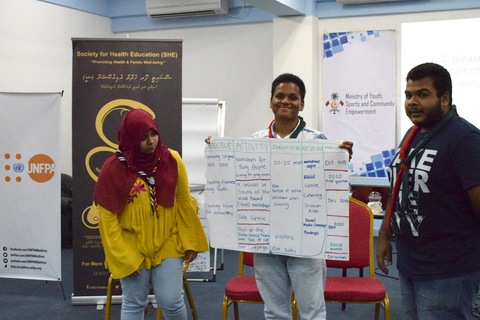“I wish I could have talked to someone my age about what happened, without judgement,” says Aisha.
Aisha* became pregnant when she was 21, out of wedlock. Much like most young people her age, she did not know what to do or where to get help. “I didn’t speak to anyone. It wasn’t safe. I’d have been judged or reported to the authorities… worst of all, my boyfriend wanted nothing to do with it. I was alone, confused, scared.”
Aisha ultimately decided to fly to Sri Lanka to get an abortion on her own.
In Maldives, 25 percent of men and 21 percent of women had sex in their teen years, according to the Maldives Demographic and Health Survey. However, speaking about sex and reproductive health in general is taboo in most social settings. This is especially true in rural islands; young people hesitate to breach the topic even with health professionals.
Research shows how young people in Maldives turn to their friends or the internet over talking to a professional about their sexual and reproductive health concerns. Without access to knowledge on sexual and reproductive health, young people cannot make informed decisions about their bodies. Peer education helps provide this information to young people, and enable them to spread the word as advocates to the cause.

An intensive 10 day training was conducted by UNFPA recently on Sexual Reproductive Health (SRH) with the support of the Ministry of Youth, Sports and Community Empowerment, and Society for Health Education. Around thirty peers, aged 16-25, were trained to guide young people to make informed decisions on topics such as gender-based violence, teen pregnancy, sexually transmitted diseases and prevention, as well as mental health and well-being. These are topics that are not commonly discussed in Maldivian society.
These peers come from a range of youth-based organizations with potential to reach out to a wider audience of young people. These young people are committed to teach the new knowledge within their circles to promote SRH knowledge, so that girls like Aisha can make informed choices. Their parent organizations: Maldives Girl Guides Association, Scouts Association of Maldives, Maldivian Red Crescent and Care Society are committed to provide continuous support for the peers to take their action plan forward.
“I want to give back what I learnt to those who need it most; I want to make a difference,” says Inas Rasheed, a peer educator already engaged in outreach activities at the islands via the Youth Health Café. “I hope that we all can create such opportunities for other youth out there who need a safe space.”
UNFPA builds capacity of young people by providing essential SRH information to young people, policy advocacy, and peer education programs. Through these efforts, UNFPA hopes to cast a wider net to reach vulnerable Maldivian youth like Aisha, and as a result, strengthen referral systems to existing sexual health service providers such as SHE and Youth Health Café.
* "Aisha's" name have been been changed to protect her from stigmatization

